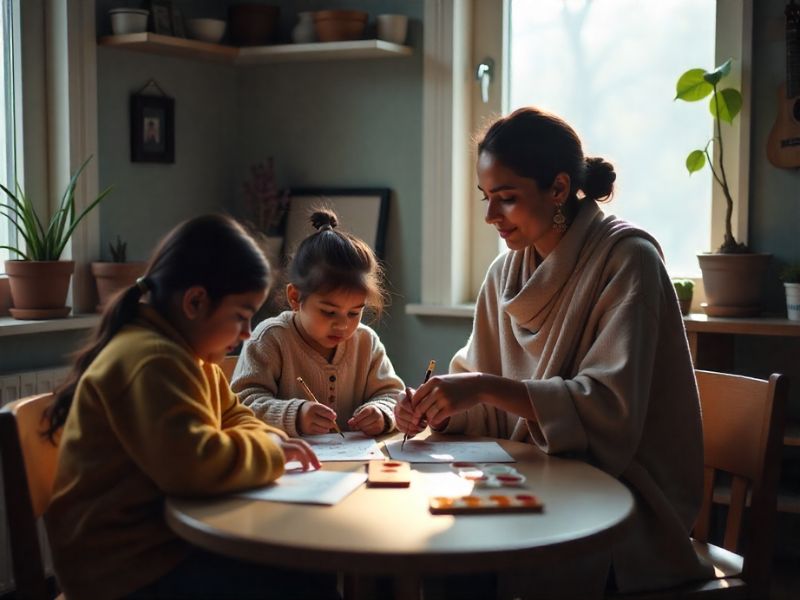No products in the cart.
Supporting Your Child’s Preschool Learning at Home
Chitra Khanna, Content Strategist at KLAY Preschools & Daycare
Supporting your child’s preschool learning at home doesn’t need to be complicated. As a parent, you play a crucial role in helping your child make sense of the world through simple, everyday experiences. Start by creating a calm and inviting space where they can play, read, and explore.
Understanding the importance of preschool education for your child goes beyond academics. Maintain a steady routine to provide structure to their day, and incorporate fun, hands-on activities such as building with blocks, drawing, or helping you in the kitchen.
Through conversations and playful moments, you can reinforce the lessons your child is learning in preschool, helping them grow in confidence and prepare for what’s ahead.
8 Effective Ways to Support Your Child’s Preschool Skills
You can help your preschooler’s development by embracing play-based learning, encouraging independence through self-help tasks, and creating opportunities for social interaction. Supporting early language and literacy skills while guiding positive behaviour also lays a strong foundation for their growth and self-assurance.
Let’s look at the core skills your child develops in preschool — and how you can nurture them at home.
1. Letters and Sounds in Preschool
Learning the alphabet and connecting letters with their sounds prepares children for reading and writing.
How You Can Help:
- Sing the ABC song and practise letter sounds.
- Use magnetic letters to form simple words.
- Read aloud and ask your child to spot certain letters on the page.
- Play games that connect sounds to familiar objects (e.g., “B is for ball”).
2. Language and Communication Skills
Your child is learning to express their thoughts, describe things, ask questions, and follow directions. These skills help them connect with others and build confidence in social settings.
How You Can Help:
- Have meaningful conversations daily. Ask open-ended questions like, “What was your favourite part of today?”
- Read together often. Point out new words, discuss the pictures, and encourage your child to retell the story in their own words.
- Sing rhymes, play sound games, or name objects while running errands to boost vocabulary.
- Even a short chat while cooking dinner can be a language-rich moment.
3. Colours, Shapes, and Objects
Recognising shapes and colours is one of the most engaging preschool learning activities. Children begin this at school, and you can easily continue it at home to strengthen their vocabulary and observation skills.
How You Can Help:
- Play colour and shape matching games.
- Point out shapes and colours around the house or outdoors.
- Use picture books to name and describe everyday objects.
- Sort toys or snacks by shape, size, or colour.
4. Early Maths and Number Sense
Preschool introduces children to numbers, shapes, patterns, and basic concepts such as more or less, big and small, and first and last.
How You Can Help:
- Count everyday items together — steps, toys, or snack pieces.
- Sort objects by colour, shape, or size while tidying up.
- Introduce simple comparisons: “Who has more blocks?” or “Which apple is bigger?”
- Turn daily tasks into maths practice, such as asking your child to give everyone two spoons or find three red items in the room.
5. Cutting and Drawing
Fine motor skills, like cutting with safety scissors and drawing shapes, are essential for hand–eye coordination and early writing ability.
How You Can Help:
- Provide child-safe scissors to practise cutting along lines.
- Offer crayons, pencils, or markers for free drawing.
- Trace shapes and letters together.
- Use playdough or finger painting to strengthen small hand muscles.
6. Social and Emotional Development
Preschoolers are learning to identify emotions, take turns, share, and collaborate. Understanding feelings and forming relationships are vital for early development.
How You Can Help:
- Talk about feelings: “You look sad. Do you want to tell me what happened?”
- Model empathy by acknowledging emotions and guiding your child through frustration.
- Arrange simple playdates or encourage pretend play to practise cooperation.
- Role-play everyday situations, such as asking for help or waiting in line, to build emotional intelligence.
7. Physical Development
This covers gross motor skills (running, jumping) and fine motor skills (holding a crayon, fastening buttons). Preschool fosters both through play and active learning.
How You Can Help:
- Encourage movement through dancing, hopping, climbing, or simple obstacle courses.
- Support fine motor skills with activities like stringing beads, building blocks, or playing with dough.
- Practise real-life tasks together — pouring water, folding napkins, or using scissors safely.
8. Cognitive and Problem-Solving Skills
Cognitive development includes thinking, experimenting, making decisions, and learning how things work. Preschoolers love discovering solutions for themselves.
How You Can Help:
- Ask “why” and “what if” questions to inspire curiosity.
- Offer puzzles, matching games, or building sets that require planning.
- Let your child solve small problems, like how to open a tricky box or stack a taller tower.
- Encourage mistakes as part of learning — it builds resilience and confidence.
Supporting Milestones at Home
These milestones can all be nurtured through simple, playful experiences. From stacking blocks to telling stories at bath time, everyday moments can reinforce what your child learns at preschool.
For more fresh, hands-on ideas, see our blog on engaging preschool activities you can do at home — designed to complement what your child is already exploring in the classroom.
Simple Tips to Reinforce Preschool Learning
- Make Reading a Daily Ritual: Reading together builds vocabulary, imagination, and attention span. Let your child choose books sometimes and ask them to guess what might happen next.
- Turn Play into Learning: Build forts, sort toys by colour, or pretend to run a shop. Play strengthens problem-solving, language, and creativity.
- Step Outside: Nature is a treasure trove of learning. Collect leaves, cloud-watch, or observe animals to boost observation and sensory development.
- Have Conversations About Everyday Things: Talk about what you see while driving or what’s for dinner. Give your child time to respond to encourage communication skills.
- Create Brain Rest Time: Balance screen use with quiet play, music, or calm drawing to help maintain focus and emotional balance.
By weaving simple learning moments into your daily routine, you can lay a strong foundation for your child’s academic and emotional growth. Small efforts — a walk in the park, counting carrots at lunch — can lead to significant progress.
Your encouragement, presence, and curiosity are some of the most powerful tools your child needs. After all, learning begins at home — and you are their very first teacher.
Also Read: Why Character can’t be outsourced
Post Views: 180
Tags: Parents Corner















Add comment